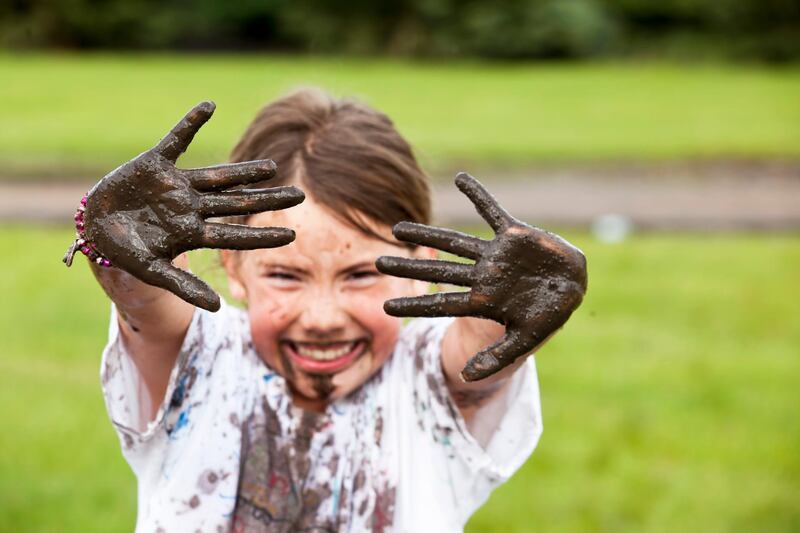This week passed much like any other in a blur of competing demands: homework and spelling tests, signed permission slips, the rota of baths, hair washes and after-school activities, a trip to the lost-and-found cupboard, the tyranny of packed lunches. Then to liven things up, my eldest daughter, who's 8, declared one evening that she doesn't like her tummy. "It's too fat," she told me, sucking it in in front of the mirror. "I need to get more muscles like her." Most of the muscles in our family belong to her sister, 6, who is built like an Olympic gymnast. Both are beautiful in different ways, but try telling that to the furrowed brow of my 8-year-old. (I did my best, of course.)
Her comments took me by surprise. Conscious of the misery that women of all ages inflict upon themselves over their appearance, I’ve always taken pains to talk about valuing people for who they are, not what they look like. Not to mention discussing the wonderful machine that is the human body. That evening our conversation ended with us both repeating: “I love myself. I love my amazing body. I am perfect just the way I am.” When all you have in your back pocket is a mantra, it’s time to revise the subject of building self-esteem. Here’s where to start.
Don’t confuse self-confidence with self-esteem
You can win gold medals galore for sports, public speaking or music and still have very low self-esteem. Self-esteem is defined as a respect for oneself, as opposed to self-confidence, which equates to a faith in your own abilities or judgement. However, recent research has shown that there’s a correlation between the two when girls hit puberty. A survey of 10,000 girls in America by Ruling Our Experiences, a not-for-profit organisation that studies the challenges young women face, showed that girls’ confidence dips significantly between the fifth and ninth school grades (ages 10 to 15), and they begin to feel dissatisfied with the way they look. Participation in team sports is shown to help counter this, with girls who play sports 11 per cent more likely to say that they are “happy the way they are”, and 16 per cent less likely to want to change how they look. Participation, and not success, is key here, so get your girl out on the field having fun.
Forget pretty in pink
In the UAE, as elsewhere, there is a cutesy trend towards dressing little girls like miniature mums, complete with pedicure parties for youngsters' birthdays. While some might view this as harmless fun, others such as psychologist Steve Biddulph regard it as lunacy. It's "the razor's edge of turning a girl towards self-consciousness and focusing on how they look, which in this era of massive anxiety about looks will be total poison to their mental health", he declares in 10 Things Girls Need Most. It's crucial, he argues, in his brilliant book to encourage your daughter to get outside, get dirty and laugh in the face of sexist claptrap.
Say it, girl
This week, I held my daughter’s hand while she asked her teacher why she hadn’t won a prize at school in spite of all her hard work. She’d agonised over putting the question, worried that she might appear arrogant or rude. The answer when it came didn’t matter; what’s far more important is that my daughter had the courage to ask the question and that her teacher listened to and answered her respectfully. Having your opinions heard and feeling a sense of agency are vital to our self-esteem, and that starts at home when parents ask: “What do you think?”
It's what you do, not what you wear
Fast cars, expensive handbags, branded everything, birthday parties at five-star hotels, the most ostentatious party bags: signifiers of wealth are casually commonplace in the UAE, and it’s all too easy to feel the pressure to keep up. The idea that appearance denotes status is a toxic message for kids, particularly girls who are going to have a love-hate relationship with their appearance. So forget compliments based on looks; pretty is not best. Putting an emphasis on what your children have achieved (as opposed to putting pressure on them to achieve) will go some way to countering the myth that being shiny 24/7 matters.
Unconditional love
Numerous academic studies support the notion that a close and affectionate parent-child relationship nurtures self-esteem. Spending time as a family to show your kids that how much they matter, putting your phone away to remove distractions and telling your daughter you love her everyday will build that bond. Whether your child is 16 months or 16 years old, you can never say too often (mantra alert): “You’re amazing. I love you exactly the way you are.”
_______________________
Read more:
[ How to talk to kids about scary stuff ]
[ How to talk to kids about money ]
[ How to talk to kids about healthy eating ]
_______________________





